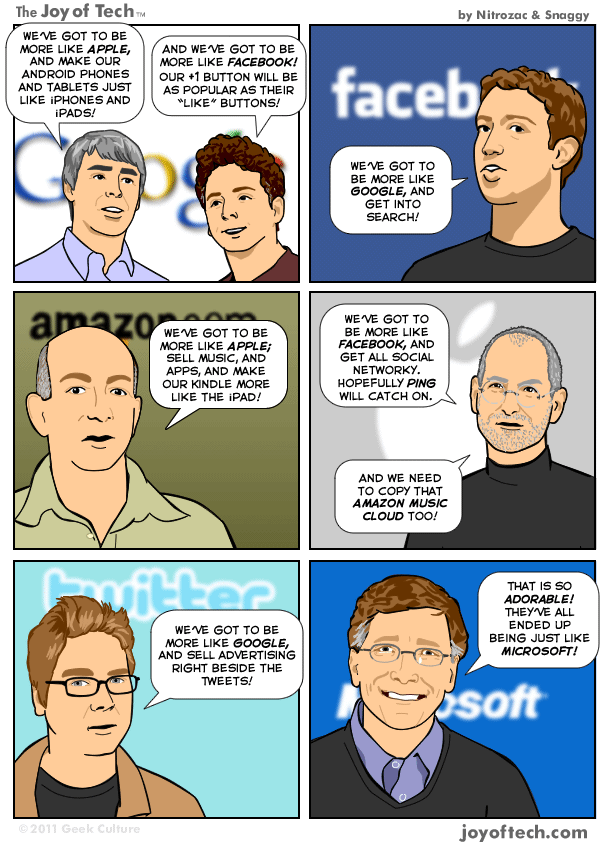Fall is in the air! Schools are back in session, football has kicked into high gear, and the rants are ready to return. Since school is back in session, its time to address a common misconception that is more marketing buzz word than true life. As much as I enjoy social media platforms, applications, and tools... SOCIAL MEDIA IS NOT A PARTY. To view facebook, Google+, twitter, Ning, or any other social platform as a 'party' is 100% wrong. Social Media is a feature that helps enable and facilitate the connection of individuals and things to their social circles. No one is 'partying' on facebook. If they are blogging at a party, they are talking about partying...not partying (at least not yet - Internet of Things).
Let's do an experiment. The hypothesis is that social network is a party... let's test that.
Is this a party...
Can't argue too much with Animal House and John Belushi. Wonder if the comments on facebook ever get this rowdy? Also, It would be great if we flooded this song with advertisements for Shout laundry detergent. Oh goody I can connect with Shout on facebook, quick let me like this!
Okay, okay, simmer down now. Now what about this picture... you tell me, PARTY or party?

Hmm... hard to say. I mean their food isn't there yet, so what's wrong with a little digital conversation. After all, talking is overrated. Pssh, forget about friends... I can't not share with all of my 100 followers on twitter! They too must rejoice in my party hearty dinner!
Or this sad characterization using one of the original social tools... text messaging!
While hilarious... if this is a party, then I'm out!
While I may not have exactly followed the scientific method, the facts should be clear... social media is NOT a party. Just because it organizes your contacts, provides application connections to friends so that you can share, and allows you to post social commentary, it does not mean that it is a party.
Many people will argue that social media has forever changed the way that we interact. Yes it has... it has enabled us to take really cool web applications like micro blogs, photo sharing, video sharing, collaborative video, location sharing, live chat, gaming, and more and allowed us to connect it all to each other and then some.
But in the end social is ONLY a product feature, not an application itself. The social component is a feature that allows things (both human and non-human) to connect through an action. The first social action was doing stuff... I bet old Adam woke up in the Garden of Eden with a bunch of crazy ideas and interactions, but he had no way to communicate it or record it. Each interaction was stuck in the proximity of those interacting and the communication and documentation methods of the time. As we learned to talk, write, and communicate as a species, we used technology and innovation to expand our proximity. So what was the original facebook? It was the phone book! The original hot or not? Every Madman's little black notebook. People used documentation, categorization, and grouping to begin to make and maintain social connections. Enablers like the telephone, air travel, cell phones, and the internet set the table for ever expanding and near infinite proximity. With the challenges of proximity obliterated by the platform of the internet, the future is chock full of connective possibilities. Connectivity is the REAL word for social media. Before 'social media' was coined, people had been collaborating through chat rooms, gaming rooms, xbox live, and numerous other applications, tools, and portals. With internet 2.0 (I hate this term, but its applicable) came the ability to further enhance the online experience making web-based applications truly comparable to desktop versions and connectivity to one another through web services. This birthed an infinitude of possibilities as viable digital applications grew up from the tech bubble of the early 2000s. Polished applications such as email enabled a mass digital connection of people, collecting tools such as contact list management, simple document editing, and file attachments allowing people to begin to index and connect their lives digitally. Savvy tool and application builders used viral components to leverage the social circles created by email and other means to create user bases. The most savvy tools and applications early on allowed the ability to interact within the user base - meaning I could share and communicate with my social circle in the application. Then, as with all industries, tool and application conversion occurred.
facebook, Google, Twitter and many others began to realize that all these applications were more useful together than apart. So they bundled key tools that dealt with common social interactions and built one location so that they could all be in the same proximity. facebook and Google+ are no more clubs than they are the meeting house. So the Social Network has it wrong, while Zuckerberg may have intended to build the
"Final Club except we're the president," he really only built the building and the amenities that the club is housed in. And that is why everyone wants to be apart of it, they made it easy to reconnect with friends, post pictures, tag friends, and market your products.
The question is, do you really want a house party sponsored by Shout, Pampers, Nike, Coke, Boeing, NBC, and your local deli? The real question is how will we as a society react. Will we accept the continued growth of advertisements in our Social House as a cost of using the service, or does it increasingly become bothersome and turn us away? Similarly, our content is valuable, when are we going to realize it and ask for our fair share of the profit? Time will tell, innovation will flourish, but one thing will remain... Social Media will never be a Party, it will ever remain one of the vehicles to make the party happen.
-K




